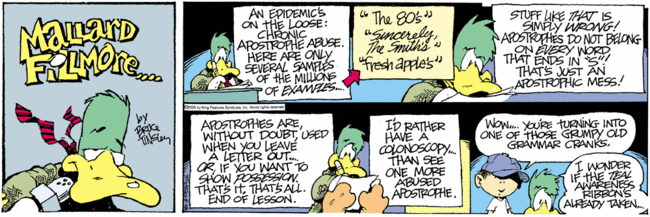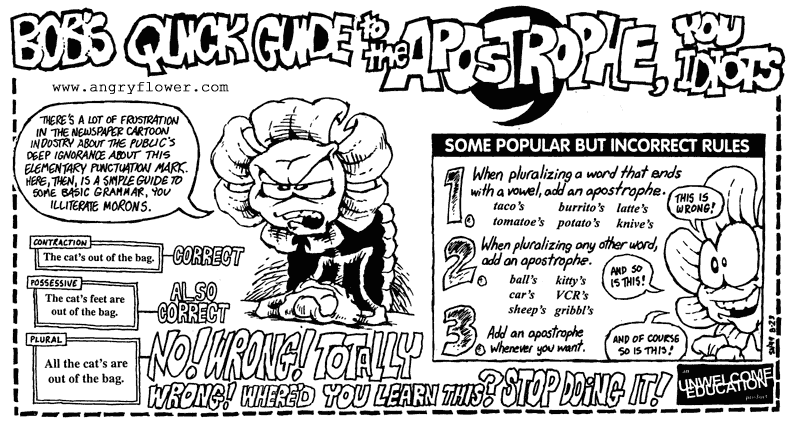August 30, 2005
"Grammar cranks" of the right
[Guest post by Benjamin Zimmer] Linguistic persnicketiness is certainly not restricted to any particular political ideology. But prescriptivist gripes are sometimes grounded in a conservative distaste for loosey-goosey moral relativism and the like. Here are two defenders of language conventions hailing from the political right: one a comic-strip character and one the current Supreme Court nominee.
The first example is Bruce Tinsley's comic strip Mallard Fillmore, marketed as a conservative answer to such left-leaning fare as Doonesbury and The Boondocks. Tinsley describes his protagonist (who bears a striking resemblance to Daffy Duck) as "a seasoned, rumpled ex-newspaper reporter" who "thinks we average, hardworking Americans need a break instead of a lecture." On Sunday, however, Mallard apparently thought we average, hardworking Americans needed a lecture after all (albeit in rhyme): a punctuation rant in the manner of Lynne Truss.

Mallard must have been reading Truss's best-seller, Eats, Shoots & Leaves: The Zero Tolerance Approach to Punctuation, since he echoes her impassioned plea, "How much more abuse must the apostrophe endure?" But Truss never states a black-and-white rule that apostrophes are only used "when you leave a letter out, or if you want to show possession." There are plenty of exceptions, such as the use of apostrophes in the pluralization of letters (e.g., "mind your p's and q's") or the pluralization of words used citationally (e.g., "the's and a's are reduced before consonants").
Mallard's examples of rampant apostrophization not surprisingly include the much-maligned greengrocer's apostrophe ("fresh apple's"), along with extraneous apostrophes in decade names ("the 80's") and pluralized family names ("the Smith's"). But as "a seasoned, rumpled ex-newspaper reporter," Mallard should know that the jury's still out on apostrophizing decade names. The New York Times house style, for instance, keeps the apostrophe in for names of decades; a search on the Times archive finds five examples of "the 80's" in Sunday's paper alone. On the other hand, given his usual tirades against the liberal domination of the media, Mallard might simply take this as an indication that the bastion of the MSM is too weak-kneed and morally relativistic to enforce proper rules of punctuation.
Rush, the little boy in the strip, warns Mallard that he's "turning into one of those grumpy old grammar cranks." (Linguists have grown accustomed to seeing "grammar" used as a catch-all term to encompass any number of perceived linguistic conventions, from punctuation to usage to pronunciation, depending on the pet peeves of the writer.) As it happens, the apostrophe-abusing New York Times had an article on Monday about a grumpy young grammar crank in the 80s (or the 80's), one who would later in life be nominated to become a Supreme Court justice. Under the headline "In Re Grammar, Roberts's Stance Is Crystal Clear," Anne Kornblut approaches the recently released Reagan-era memos of John Roberts with an eye towards his "tendencies as a grammarian." Roberts, we learn, "frequently peppered notes and documents with minor syntax corrections even when the basic legal arguments w ere sound." Some of his corrections really did have to do with grammar or syntax, such as his insistence on maintaining consistent parallel structure and pronominal reference. Other cases noted by Kornblut simply indicate a pickiness regarding word choice, such as Roberts's preference for voluntarism over volunteerism, ensuring over insuring, and multilateral over plurilateral. (We would need to see the context of these memos to know what beefs Roberts might have had with the offending words.)
Roberts also took issue with the phrasing of Neil Armstrong's famous line when setting foot on the moon (which was to be quoted by his boss, White House counsel Fred F. Fielding, in remarks at a Kennedy Space Center picnic):
"It is my recollection," Mr. Roberts wrote, "that he actually said 'one small step for a man, one giant leap for mankind,' but the 'a' was somewhat garbled in transmission. Without the 'a,' the phrase makes no sense."
Roberts is right that the phrase makes no sense without the "a", but he should take it up with Armstrong himself. The line wasn't actually "garbled in transmission" — Armstrong flubbed it, as the Snopes urban legends website has documented.
Kornblut writes, "If Judge Roberts is confirmed, and his word-consciousness follows him to the court, it will put him in the upper tier of justices who have put a premium on the English language." It's difficult to tell from the analysis of the memos if Roberts's "word-consciousness" will rise above the level of mere curmudgeonliness. But one auspicious omen appears in the graphic sidebar accompanying the article. In a memo from 1983, Roberts complains about how newspaper columnists focused on Ronald Reagan's memorable use of the word keister:
"Frankly, I've had it up to my keister with newspaper columns about an expression fairly common to those of us reared in the Midwest. I have drafted a reply." He concluded: "It is interesting how familiarity with slang phrases often varies among different parts of our country. In this case, excuse the bad pun, but I suppose it may depend on where one was reared."
Roberts makes a rather obvious dialectological point, but it's one that is frequently lost on self-appointed guardians of good "grammar". I take this as a hopeful sign that Roberts is no strict constructionist when it comes to linguistic variation.
[Update (by Mark Liberman): Bez Thomas, among others, reminded us of a classic apostrophe rant in cartoon form, from the left end of the political spectrum:

Both from the right and from the left, (some of) these defenses of linguistic norms are notable for their moral and emotional fervor. As reported in the NYT, Judge Robert's linguistic strictures are rather even-tempered in comparison.]
Posted by Mark Liberman at August 30, 2005 12:11 AM